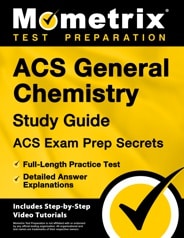The American Chemical Society (ACS) is a nonprofit organization based in the US, whose goal is to support students, teachers, and general scientific advancements and research. If the college you attend offers an ACS-accredited degree program, you will most likely be required to take the ACS college chemistry exam as one of your final exams.
Click “Start Test” above to take a free ACS General Chemistry practice test, and check out our premium-quality ACS General Chemistry study guide by clicking below!
ACS General Chemistry Exam Outline
The ACS General Chemistry Exam contains 70 multiple-choice questions and has a time limit of 110 minutes.
These are the main content categories on the exam:
- Atomic structure
- Electronic structure
- Formula calculations and the mole
- Stoichiometry
- Solutions and aqueous reactions
- Heat and enthalpy
- Structure and bonding
- States of matter
- Kinetics
- Equilibrium
- Acids and bases
- Solubility equilibria
- Thermodynamics
- Electrochemistry
- Nuclear chemistry
These are the topics you should be familiar with before taking the exam:
Basic Chemistry
- Vocabulary/terminology
Intermolecular Forces
- Lattice energy
- Phase transitions
- Phase diagrams
- Relation of boiling points and melting points to intermolecular forces
- Types of solids
- Unit cell calculations
Types of Solutions
- Solution concentrations
- Solubility curves
- Colligative properties
- Colloids
- Solubility curves for gases vs. curves for solids
Kinetics
- Experimental determination of rate
- Determining the rate law using the initial rate method
- Rate constants
- Elementary reactions
- Catalysis
- Reaction mechanisms
- Collision and transition state theory
- Activation energy, concentration-time calculations
- Temperature and rate
- Half-lives
- Graphical determinations of reaction order and rate constant
- Potential energy diagrams
Chemical Equilibrium
- Equilibrium constant
- Reaction quotient
- Le Chatelier’s Principle
- Predicting reaction direction
- Calculating equilibrium concentrations
- ICE tables
Acid-base Theories
- Arrhenius and Brønsted-Lowry
- Acid-base strength and relation to molecular structure
- Self-ionization of water
- pH
- Strong and weak acids and bases
Acid and Base Ionization
- Polyprotic acids
- Salt solutions
- Common ion effect
- Buffers
- Titration curves
Solubility Product Constant
- Common ion effect
- pH and solubility
- Precipitation calculations
- Solubility rules (and exceptions to the rules)
Second and Third Laws of Thermodynamics
- Entropy and change in entropy (∆S)
- Free energy and Gibbs free energy (∆G)
- Spontaneity
- Relation to the equilibrium constant
- Work
- Extensive property
- Enthalpy and change in enthalpy (∆H)
- Hess’s Law
- Specific heat capacity
Balancing Redox Reactions
- Voltaic and electrolytic cells
- Cell notation
- Electromagnetic fields
- Electrochemical cells
- Electrode potentials
- Oxidation numbers
- Oxidizing and reducing agents
- The strength of these agents
- Applications of electrochemistry
- Electrolysis
Fission
- Fusion
- Radioactivity
- Nuclear bombardment reactions
- Radioactive decay
- Half-lives
- Mass-energy calculations
- Isotopes and nuclide symbols
- Mass numbers and atomic weights
- Subatomic particles
Chemicals’ Physical Change/Properties
- Significant figures
- SI units and prefixes
Nomenclature
- Polyatomic ions and Greek prefixes
- Molecular compounds
- Ionic compounds
- Acids
- Binary compounds
- Ion charge based on position in the periodic table
- Diatomic elements
Combustion and Double Replacement Reactions
- Net ionic equations
- Spectator ions
- Molecular equations
- Gas-producing reactions
Basic Stoichiometry
- Molar masses
- Molar ratios
- Limiting reactant
- Percent composition
- Molarity
- Percentage yield
- Empirical and molecular formulas
Gas Laws
- Empirical
- Ideal
- Effusion
- Partial pressures
- STP
- Kinetic-molecular theory
- Barometers and manometers
Energy
- Frequency
- Wavelength
- Emission spectra
- Electron configurations
- Orbital diagrams
- Quantum numbers
Periodic Trends
- Atomic radii
- Ionization energies
- Electronegativities
- Ionic radii
Lewis Structures
- Resonance
- Formal charges
- Bond polarity
- Bond order
- Exceptions to the octet rule
VSEPR Model
- Hybridization
- Polarity of molecules
- Lone pairs
- Bonding pairs
- σ and π bonds
Check Out Mometrix's ACS General Chemistry Study Guide
Get practice questions, video tutorials, and detailed study lessons
Get Your Study Guide

ACS General Chemistry Online Prep Course
If you want to be fully prepared, Mometrix offers an online ACS General Chemistry prep course designed to give you everything you need to succeed!
Here’s what you’ll find in the ACS General Chemistry course:
- 50+ Review Lessons Covering Every Topic
- Over 350 ACS General Chemistry Practice Questions
- 50+ Review Videos
- Money-back Guarantee
- Mobile Access
Everyone learns differently, so we’ve tailored the ACS General Chemistry online prep course to ensure every learner has what they need to prepare for the ACS General Chemistry exam.
Click below to check it out!
Test Day
Depending on where you take the exam, you may be required to bring different items along with you, so check with the school administrators to ensure you’re prepared. Generally, you will be asked to bring two sharpened No. 2 pencils. A scratch piece of paper will be provided, and you are allowed to bring a non-programmable calculator if you would like.
If you do not know how to answer a particular question, it is best to skip it and go back to it once you complete the questions you do know.
How the Exam is Scored
To pass the ACS General Chemistry exam, you must answer at least 50% of the questions correctly.
Your score is based on a percentile ranking. In percentile rankings, there is a good chance that the questions you do not know how to answer are also questions that several other students have trouble answering.
With percentile rankings, the ranking you get, such as a 90th percentile, indicates that you scored higher than 90% of the students on the national norm.
The chart below outlines the general percentile rankings estimated for the ACS General Chemistry exam on a national level.
Note that the methods used in grading this exam will depend on the professor’s preferences and the college guidelines for this type of grading. Some professors will use a curving method while grading, while others do not.
How to Study
How to Study Effectively
Your success on ACS General Chemistry test day depends not only on how many hours you put into preparing but also on whether you prepared the right way. It’s good to check along the way to see whether your studying is paying off. One of the most effective ways to do this is by taking practice tests to evaluate your progress. Practice tests are useful because they show exactly where you need to improve. Every time you take a free ACS General Chemistry exam practice test, pay special attention to these three groups of questions:
- The questions you got wrong
- The ones you had to guess on, even if you guessed right
- The ones you found difficult or slow to work through
This will show you exactly what your weak areas are and where you need to devote more study time. Ask yourself why each of these questions gave you trouble. Was it because you didn’t understand the material? Was it because you didn’t remember the vocabulary? Do you need more repetitions on this type of question to build speed and confidence? Dig into those questions and figure out how you can strengthen your weak areas as you go back to review the material.
Answer Explanations
Additionally, many ACS General Chemistry practice tests have a section explaining the answer choices. It can be tempting to read the explanation and think that you now have a good understanding of the concept. However, an explanation likely only covers part of the question’s broader context. Even if the explanation makes sense, go back and investigate every concept related to the question until you’re positive you have a thorough understanding.
Comprehend Each Topic
As you go along, keep in mind that the practice test is just that: practice. Memorizing these questions and answers will not be very helpful on the actual test because it is unlikely to have any of the same exact questions. If you only know the right answers to the sample questions, you won’t be prepared for the real thing. Study the concepts until you understand them fully, and then you’ll be able to answer any question that shows up on the test.
Strategy for ACS General Chemistry Practice
When you’re ready to start taking practice tests, follow this strategy:
- Remove Limitations. Take the first test with no time constraints and with your notes and ACS General Chemistry study guide handy. Take your time and focus on applying the strategies you’ve learned.
- Time Yourself. Take the second practice test “open book” as well, but set a timer and practice pacing yourself to finish in time.
- Simulate Test Day. Take any other practice tests as if it were test day. Set a timer and put away your study materials. Sit at a table or desk in a quiet room, imagine yourself at the testing center, and answer questions as quickly and accurately as possible.
- Keep Practicing. Keep taking practice tests on a regular basis until you run out of practice tests or it’s time for the actual test. Your mind will be ready for the schedule and stress of test day, and you’ll be able to focus on recalling the material you’ve learned.
FAQs
Q
How many questions are on the ACS General Chemistry exam?
A
There are 70 multiple-choice questions on the ACS General Chemistry exam.
Q
How long is the ACS General Chemistry exam?
A
The exam lasts a total of 110 minutes.
Q
What is a passing score on the ACS General Chemistry exam?
A
You must answer at least 50% of the 70 questions correctly to pass this exam. The exam is generally scored using a percentile ranking system.



